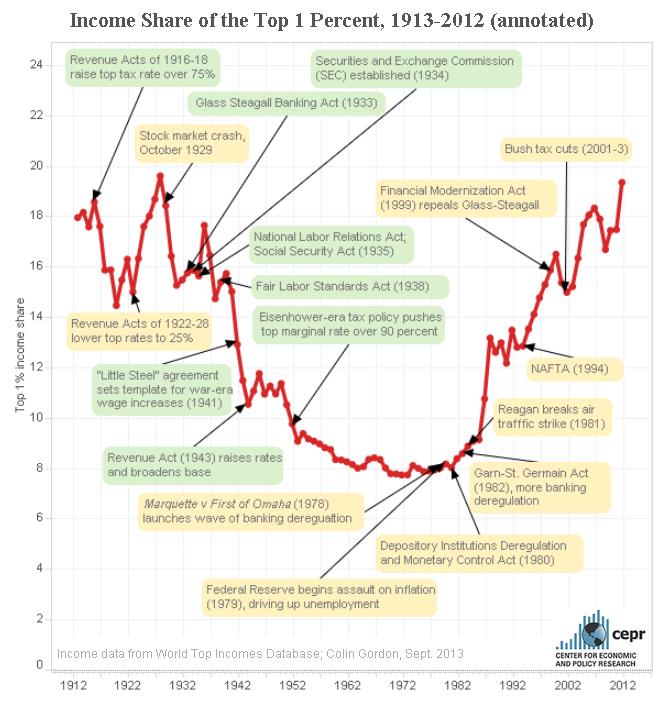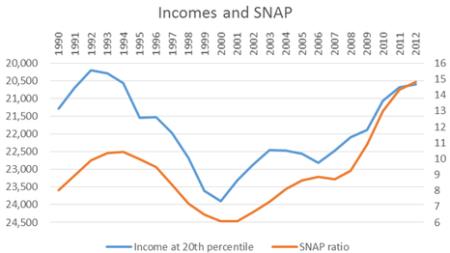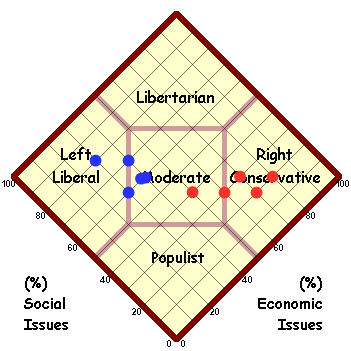 Colin Gordon over at the Center for Economic and Policy Research annotated this great graph of the income share of the top one percent (from data by Emmanuel Saez). He says that the events are meant to be “representative rather than exhaustive.” Of course, the pattern is clear, “The share of the top one percent rose during eras of tax cutting, light financial regulation (or deregulation), and labor weakness. And inequality narrowed when policy pushed in the opposite direction.”
Colin Gordon over at the Center for Economic and Policy Research annotated this great graph of the income share of the top one percent (from data by Emmanuel Saez). He says that the events are meant to be “representative rather than exhaustive.” Of course, the pattern is clear, “The share of the top one percent rose during eras of tax cutting, light financial regulation (or deregulation), and labor weakness. And inequality narrowed when policy pushed in the opposite direction.”
This pushes back against one of the most annoying aspects of economic reporting in this country. We are constantly told that there is nothing the government can do about inequality and associated problems. Supposedly, the current system is just the outcome of a globalized economy and the only way we could fix it would be to have a command economy that would hurt everyone. But of course this isn’t the case at all. Inequality went down during much of the last century because of government policy—especially policies that allowed workers to organize. And the huge increase in inequality over the last 35 years has been the outcome of government policies that have harmed worker organizing ability and lowered taxes on the rich.
The greatest victory of the rich over the past 30 years has been to get the public intellectual class to believe that the smartest thing is to solemnly shake their heads and claim that there just aren’t any easy answers. We’ve seen that throughout this economic crisis where the important pundits (e.g. Thomas Friedman) have claimed that there is nothing we can do but grind our way back. The fact that World War II showed the way out of the Great Depression seems to have been erased from memory. And we are left with the low inflation and high unemployment answer to the economic downturn that just so happens to be exactly what is best for the rich.


 On this day in 1902, the great poet
On this day in 1902, the great poet  Yesterday, the House Republicans finally got around to dealing with the Supplemental Nutritional Assistance Program (SNAP), generally known as “food stamps.” Traditionally, food assistance to the poor was linked to farm subsidies in the Farm Bill. But this year, the Republicans just couldn’t do it, because the leadership was only able to offer a $20 billion cut to SNAP—the nihilistic wing of the party refused to vote for the bill without a $40 billion cut. So back in July, they
Yesterday, the House Republicans finally got around to dealing with the Supplemental Nutritional Assistance Program (SNAP), generally known as “food stamps.” Traditionally, food assistance to the poor was linked to farm subsidies in the Farm Bill. But this year, the Republicans just couldn’t do it, because the leadership was only able to offer a $20 billion cut to SNAP—the nihilistic wing of the party refused to vote for the bill without a $40 billion cut. So back in July, they 


 The Republicans really are divided. But it isn’t between the crazy and non-crazy. It is between the nihilists and the extremists. What are normally referred to as the Tea Party are just conservatives who aren’t interested in the political process and so want to send “messages.” As a result, those who want to, you know, win elections, are pretty upset at what is going on in Washington right now. Bear in mind, these people are not any more interested in what is best for the country than the Tea Party is; they just recognize that explicitly trying to destroy the nation is a really bad marketing campaign for the GOP.
The Republicans really are divided. But it isn’t between the crazy and non-crazy. It is between the nihilists and the extremists. What are normally referred to as the Tea Party are just conservatives who aren’t interested in the political process and so want to send “messages.” As a result, those who want to, you know, win elections, are pretty upset at what is going on in Washington right now. Bear in mind, these people are not any more interested in what is best for the country than the Tea Party is; they just recognize that explicitly trying to destroy the nation is a really bad marketing campaign for the GOP.